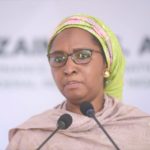The Honourable Minister of Finance, Budget and National Planning, Mrs. Zainab Ahmed, has disclosed recommendations of the crisis management committee set up by President Muahammadu Buhari comprising senior government officials to consider measures to address the fiscal pressures arising from the recent drop in oil prices and highlight government’s response to globally threatened coronavirus also known as COVID-19.
In her presentation on current state of the Nigerian economy to the leadership of the 9th National Assembly, she beamed some lights on Nigeria’s current economic realities and challenges, and the government’s response to the pandemic and oil price decline in view of which she stated that the President had on Monday, 9th March 2020, set up the committee comprising Honourable Minister of Finance, Budget and National Planning as Chairperson; Minister of State for Budget and National Planning; Minister of State for Petroleum Resources; Governor of the Central Bank of Nigeria; and Group Managing Director of the NNPC as members.
The committee, which recognises that Nigeria is currently facing significant fiscal risks due to the worsening global economic outlook, was mandated by Mr. President to produce a brief report for his review and approval.
Ahmed was spot on specifically with the fact that Nigeria is highly vulnerable to the current global economic disruption caused by the COVID-19 crisis, and exposed to the risks of both a pronounced decline in oil prices and spikes in risk aversion in the global capital markets.
“Oil revenues have been significantly affected in that the oil production for 2020 year-to-date is 1.9mbpd against 2020 budget’s projection of 2.18mbpd; and Brent oil prices are US$30/b against 2020 budget’s US$57/b. Although similar challenges were experienced in 2015/2016, Nigeria now has considerably lower fiscal buffers,” she stated.
Speaking on the recommendations of the crisis management committee, Ahmed stated: “The crisis management committee recommends an integrated policy framework comprising critical and complementary measures to forestall a decline into another recession. This integrated policy framework comprises revenue measures against expenditure measures against other and administration measures. The integrated policy framework will require the requisite approvals and appropriation by national assembly. The integrated policy framework will be anchored by the Federal Finance Ministry, Federal Ministry of Petroleum Resources, and CBN.
She cautioned: “The decline in international oil prices and / or domestic production may be magnified if a severe outbreak of the COVID-19 pandemic occurs in Nigeria. Accordingly, it is critical to design, approve and implement an integrated policy framework to address these issues and ensure that Nigeria’s fiscal position is significantly more robust to weather the current fiscal shocks.”
In considering expenditure cuts arising from the decline in revenue, Mr. President emphasised the need to stimulate growth by prioritising key infrastructure projects, protecting pro-poor expenditures and ensuring adequate provision for health and education. Obviously, the fiscal stimulus package is in response to the economic crisis precipitated by the coronavirus pandemic and crash in international oil prices.
Speaking on revenue measures, she stated that there has to be increase revenues by reducing NNPC’s expenditures associated with oil revenues. According to her, the N457.5billion premium motor spirit (PMS) under-recovery has to be zero (as current oil prices below US$30/b imply that there currently is no PMS under-recovery); and there has to be a transitioning to a PMS price modulation process to be driven by underlying global oil and gas prices.
Ahmed posited to reduce other federally-funded upstream projects such that aggregate NNPC deductible expenditures are cut by 53 percent; revise 2020 budget using a US$30/b price benchmark to prepare for the worst-case scenario. “Production volume will be maintained at 2.18mb/per day; accelerate marginal fields and other licencing rounds; ramp up oil production on shut-down wells; budgeted customs revenues have been reduced from N1.5trillion to N943billion due to anticipated reduction in trade volumes; and privatisation proceeds to be cut by 50 percent, based on the adverse economic outlook on sales of the independent power projects (IPPs) and other assets.”
In the same vein, she also looked at the expenditure measures, stating that Mr. President had approved the following measures: Reduce ministries, departments and agencies (MDAs) capital expenditure (CAPEX) by 20 percent; reduce CAPEX and overheads for the top 10 government own enterprises (GOEs) in FGN 2020 budget by 25 percent, the 80 percent of savings from these top 10 GOEs’ cuts will be applied to increase their operating surpluses; similar cost cutting measures will apply to all other GOEs; and consequently, independent revenues for the federal government will increase by N67billion (being 80 percent of the N84.1billion savings from cuts to both overheads and CAPEX).
Considering other fiscal and administrative measures, Ahmed stated further: “Control the fast-growing personnel cost by efficiency measures such as nonessential recruitment; restructure social investment programmes (SIP); and design and launch other policy measures to be agreed with strategic MDAs.”
On the fiscal stimulus package, she disclosed: ”The FGN is working on fiscal stimulus measures to provide fiscal relief for taxpayers and key economic sectors, incentivise employers to retain and recruit staff during the economic downturn, stimulate investment in critical infrastructure (roads, rail and ports), review non-essential tax waivers to optimise revenues, complement monetary and trade interventions to respond to the crisis.”





